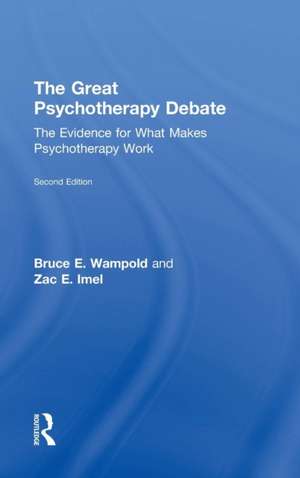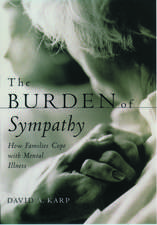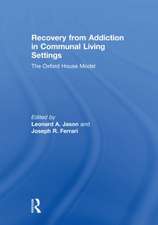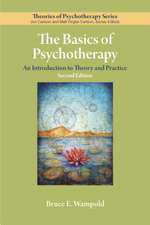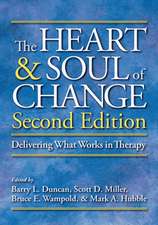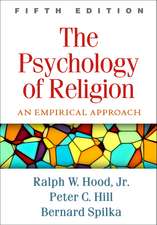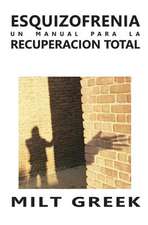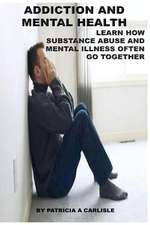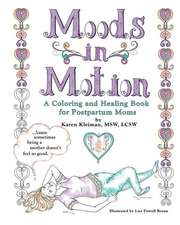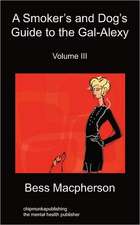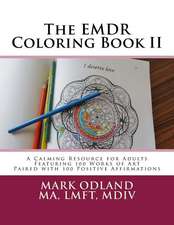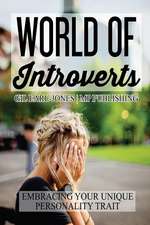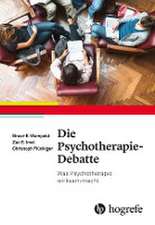The Great Psychotherapy Debate: The Evidence for What Makes Psychotherapy Work
Autor Bruce E. Wampold, Zac E. Imelen Limba Engleză Hardback – 16 feb 2015
| Toate formatele și edițiile | Preț | Express |
|---|---|---|
| Paperback (1) | 324.44 lei 22-36 zile | +21.38 lei 5-11 zile |
| Taylor & Francis – 24 feb 2015 | 324.44 lei 22-36 zile | +21.38 lei 5-11 zile |
| Hardback (1) | 1155.92 lei 22-36 zile | +24.86 lei 5-11 zile |
| Taylor & Francis – 16 feb 2015 | 1155.92 lei 22-36 zile | +24.86 lei 5-11 zile |
Preț: 1155.92 lei
Preț vechi: 1216.76 lei
-5% Nou
Puncte Express: 1734
Preț estimativ în valută:
221.22€ • 230.35$ • 186.96£
221.22€ • 230.35$ • 186.96£
Carte disponibilă
Livrare economică 17 februarie-03 martie
Livrare express 31 ianuarie-06 februarie pentru 34.85 lei
Preluare comenzi: 021 569.72.76
Specificații
ISBN-13: 9780805857085
ISBN-10: 0805857087
Pagini: 334
Ilustrații: 25 black & white illustrations, 13 black & white tables, 18 black & white halftones, 7 black & white line drawings
Dimensiuni: 152 x 229 x 23 mm
Greutate: 0.54 kg
Ediția:Revised
Editura: Taylor & Francis
Colecția Routledge
Locul publicării:Oxford, United Kingdom
ISBN-10: 0805857087
Pagini: 334
Ilustrații: 25 black & white illustrations, 13 black & white tables, 18 black & white halftones, 7 black & white line drawings
Dimensiuni: 152 x 229 x 23 mm
Greutate: 0.54 kg
Ediția:Revised
Editura: Taylor & Francis
Colecția Routledge
Locul publicării:Oxford, United Kingdom
Public țintă
ProfessionalCuprins
Preface 1. History of Medicine, Methods and Psychotherapy: Progress and Omissions 2. The Contextual Model: Psychotherapy as a Socially Situated Healing Practice 3. Contextual Model Versus Medical Model: Choosing a Progressive Research Programme 4. Absolute Efficacy: The Benefits of Psychotherapy Established by Meta-analysis 5. Relative Efficacy: The Dodo Bird Still Gets It 6. Therapist Effects: An Ignored by Critical Factor 7. General Effects: Surviving Challenges and Anticipating Additional Evidence 8: Specific Effects: Where Are They? 9. Beyond the Debate: Implications of the Research Synthesis for Theory, Policy, and Practice
Notă biografică
Bruce E. Wampold, PhD, ABPP, is the Patricia L. Wolleat Professor of Counseling Psychology at the University of Wisconsin–Madison and director of the Research Institute at Modum Bad Psychiatric Center in Vikersund, Norway.
Zac E. Imel, PhD, is an assistant professor with the counseling psychology program in the Department of Educational Psychology and an adjunct assistant professor in the Department of Psychiatry at the University of Utah.
Zac E. Imel, PhD, is an assistant professor with the counseling psychology program in the Department of Educational Psychology and an adjunct assistant professor in the Department of Psychiatry at the University of Utah.
Recenzii
"I recommend this book and would advise the fully fledged practitioner to keep coming back to it; the activist campaigning for rights and more services to be inspired by it; and researchers to take stepping stones and grow from it. As a registered counsellor and psychotherapy student, it will prove useful in my current practice as well as my ongoing studies."
—Andrea Lavers MBACP is a counsellor in private practice in north-east London, Private Practice
"The Great Psychotherapy Debate is one, if not the most, important book ever published about psychotherapy. Whether at the beginning, middle, or end of one's career, it is a must read."
—Scott D. Miller, PhD, director of the International Center for Clinical Excellence
"The first edition of The Great Psychotherapy Debate served as a gauge tossed at the feet of the prevailing medical model of psychotherapy. Professor Wampold cogently brought together the literature in the area and provided a compelling option to the empirically supported movement. As a result there has been a wealth of research examining important issues pertaining to treatment effects. The second edition is a marked improvement over the first in its inclusion and thoughtful summary of the research in the area, providing an accessible summary of what we know and what needs to be examined. The scope is broad, covering both theoretical subtleties as well as sophisticated empirical analyses. It is written to serve both the skilled psychotherapy researcher as well as advanced students in the field. An extremely important book!"
—Terence J. G. Tracey, PhD, ABPP, professor and faculty head of the counseling and counseling psychology program at Arizona State University.
"The first edition of this book was a seminal publication that helped to organize vitally important information regarding the effects of psychotherapy. The second edition updates this work with the most contemporary research and also extends the discussion on the effects of psychotherapy along several different pathways, offering important implications for the future of the field. I believe this book should be required reading for graduate students as well as anyone conducting psychotherapy research or implementing institutional policies for the delivery of psychotherapy."
—Mark Hilsenroth, PhD, professor at Adelphi University.
"Bruce E. Wampold and Zac E. Imel's The Great Psychotherapy Debate [...] is a commendable effort to explore the empirical basis undergirding the processes of psychotherapy chane. The second edition of their book is a well-written expansion and revision of their first edition. The centerpiece of the book is the authors' contextual model of psychotherapy. [...] [This] text is a significant contribution to the literature."
--Stefan G. Hoffman & Joshua Curtiss, PsycCRITIQUES, 2015
"In the first edition Wampold challenged the long-held belief that psychotherapy can best be understood from a medical model and by using a balanced and carefully selected set of studies, he presented a radical new approach, namely the contextual model, to understanding why psychotherapy works. This second addition updates this work by bringing together the wealth of research examining important issues pertaining to treatment effects since the publication of the first edition and by providing an accessible summary of what we know and what needs to be examined. [...] This new edition of The Great Psychotherapy Debate, with its inclusion of history of healing practices, medicine and psychotherapy and a thoughtful review and summary of the research in the area on common factors such as the alliance, expectations and empathy, updates the work that started in the first edition greatly, and extends the discussion on the effects of psychotherapy along different pathways, offering important implications for the future of the field. Because the scope of the book is broad enough to cover both theoretical and historical issues and also thorough, sophisticated empirical analyses, it is of use for both a psychotherapist in the field or a skilled psychotherapy researcher as well as an advanced psychology or counseling student. I heartily recommend this book for any graduate course on psychotherapy and also for anyone who wants to conduct psychotherapy research."
--Prof. Dr. Kamuran Elbeyoglu, Toros University, Turkey, metapsychology.net
—Andrea Lavers MBACP is a counsellor in private practice in north-east London, Private Practice
"The Great Psychotherapy Debate is one, if not the most, important book ever published about psychotherapy. Whether at the beginning, middle, or end of one's career, it is a must read."
—Scott D. Miller, PhD, director of the International Center for Clinical Excellence
"The first edition of The Great Psychotherapy Debate served as a gauge tossed at the feet of the prevailing medical model of psychotherapy. Professor Wampold cogently brought together the literature in the area and provided a compelling option to the empirically supported movement. As a result there has been a wealth of research examining important issues pertaining to treatment effects. The second edition is a marked improvement over the first in its inclusion and thoughtful summary of the research in the area, providing an accessible summary of what we know and what needs to be examined. The scope is broad, covering both theoretical subtleties as well as sophisticated empirical analyses. It is written to serve both the skilled psychotherapy researcher as well as advanced students in the field. An extremely important book!"
—Terence J. G. Tracey, PhD, ABPP, professor and faculty head of the counseling and counseling psychology program at Arizona State University.
"The first edition of this book was a seminal publication that helped to organize vitally important information regarding the effects of psychotherapy. The second edition updates this work with the most contemporary research and also extends the discussion on the effects of psychotherapy along several different pathways, offering important implications for the future of the field. I believe this book should be required reading for graduate students as well as anyone conducting psychotherapy research or implementing institutional policies for the delivery of psychotherapy."
—Mark Hilsenroth, PhD, professor at Adelphi University.
"Bruce E. Wampold and Zac E. Imel's The Great Psychotherapy Debate [...] is a commendable effort to explore the empirical basis undergirding the processes of psychotherapy chane. The second edition of their book is a well-written expansion and revision of their first edition. The centerpiece of the book is the authors' contextual model of psychotherapy. [...] [This] text is a significant contribution to the literature."
--Stefan G. Hoffman & Joshua Curtiss, PsycCRITIQUES, 2015
"In the first edition Wampold challenged the long-held belief that psychotherapy can best be understood from a medical model and by using a balanced and carefully selected set of studies, he presented a radical new approach, namely the contextual model, to understanding why psychotherapy works. This second addition updates this work by bringing together the wealth of research examining important issues pertaining to treatment effects since the publication of the first edition and by providing an accessible summary of what we know and what needs to be examined. [...] This new edition of The Great Psychotherapy Debate, with its inclusion of history of healing practices, medicine and psychotherapy and a thoughtful review and summary of the research in the area on common factors such as the alliance, expectations and empathy, updates the work that started in the first edition greatly, and extends the discussion on the effects of psychotherapy along different pathways, offering important implications for the future of the field. Because the scope of the book is broad enough to cover both theoretical and historical issues and also thorough, sophisticated empirical analyses, it is of use for both a psychotherapist in the field or a skilled psychotherapy researcher as well as an advanced psychology or counseling student. I heartily recommend this book for any graduate course on psychotherapy and also for anyone who wants to conduct psychotherapy research."
--Prof. Dr. Kamuran Elbeyoglu, Toros University, Turkey, metapsychology.net
Descriere
The second edition of The Great Psychotherapy Debate has been fully updated and explores a wide variety of indispensable techniques and treatments.
